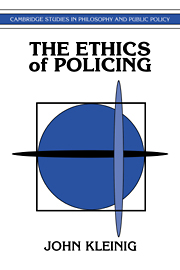Book contents
- Frontmatter
- Contents
- Preface
- 1 Introduction: ethics and police ethics
- Part I Professional ethics
- Part II Personal ethics
- 4 Institutional culture and individual character
- 5 Police discretion
- 6 The use of force
- 7 The use of deception
- 8 Entrapment
- 9 Gratuities and corruption
- 10 Public roles and private lives
- Part III Organizational ethics
- Notes
- Index of authors
- Index of subjects
4 - Institutional culture and individual character
Published online by Cambridge University Press: 05 June 2012
- Frontmatter
- Contents
- Preface
- 1 Introduction: ethics and police ethics
- Part I Professional ethics
- Part II Personal ethics
- 4 Institutional culture and individual character
- 5 Police discretion
- 6 The use of force
- 7 The use of deception
- 8 Entrapment
- 9 Gratuities and corruption
- 10 Public roles and private lives
- Part III Organizational ethics
- Notes
- Index of authors
- Index of subjects
Summary
When an organization wants you to do right, it asks for your integrity; when it wants you to do wrong, it demands your loyalty.
Author unknownLoyalty in the police department means you're willing to lie for someone else.
Bill McCarthyOur cultural ideology places much store on the individual and on the values of individuality and autonomy. And at some level that is probably as it should be. Yet individuals do not generally exist and act in isolation but as integral parts of various evolving cultural and institutional structures and groupings. Our identity as individuals is constituted in part by our roles and communal memberships. So it is with police. When a recruit enters the police academy, it “does more than give him a job; it defines who he is.”
The interplay of, and tension between, individual and social identity generates some of the central and most difficult questions of moral, social, and political philosophy and practice. The very relations that are essential to our formation and that constitute the matrix for our ongoing activity may also overwhelm us. That is no less true of police character and culture than it is of our common experience. Individual integrity and group loyalty are simultaneously expected of police officers, and some of the most difficult problems, both moral and psychological, that officers face concern the ordering of these two demands.
- Type
- Chapter
- Information
- The Ethics of Policing , pp. 67 - 80Publisher: Cambridge University PressPrint publication year: 1996

